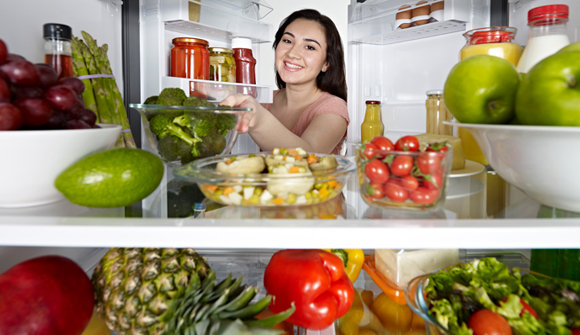Healthy Meals

For hassle-free healthy meals in a hurry, be prepared with a well-stocked kitchen. This means always having some basic ingredients in your cabinets, pantry, fridge and freezer. It can save time and worry on those busy days when you don't have a chance to get to the grocery store.
Cabinets and pantry
- Dry beans like black beans, chickpeas, pintos and red beans
- Canned “dinner builder” items like beans, chicken, salmon, tuna and soup
- Canned vegetables (like carrots, corn, green beans, peas, pumpkin and tomatoes) for adding to soup, rice, pasta and sauces
- Canned and dried fruits like apple sauce, dates, oranges, peaches, pineapple and raisins (look for items with no added sugars)
- Whole-grain pasta, brown rice and other easy whole grains like couscous and quinoa
- Whole grain bread or tortillas (if you don’t use it daily, store in the freezer)
- Old-fashioned rolled oats, instant oatmeal and whole-grain cereal for a quick breakfast
- Whole-wheat flour, oat flour and cornmeal for baking
- Nuts, seeds and nut butters for healthy snacking
- Healthy cooking oils like canola, corn or olive (buy in limited amounts because they can go rancid over time), nonstick vegetable oil cooking spray
- Balsamic vinegar and low-sodium soy sauce for salad dressings and sauces
- Spaghetti or marinara sauce in jars
- Low-sodium chicken or vegetable broth for making soup
- Dried herbs and spices, salt-free seasoning blend, pepper
Fridge and freezer
- Frozen vegetables without salty sauces (like broccoli, cauliflower, mixed vegetables, spinach and squash) make easy sides and add-ins
- Frozen fruits without added sugars (like berries, mixed fruit, peaches) for cereal, yogurt and smoothies
- Low-fat/non-fat dairy products like milk, yogurt and cheese
- Frozen meats like fish fillets, skinless chicken breasts or lean ground beef
- Soft margarine with no trans fat (made with non-hydrogenated vegetable oils, usually in a tub)
Make it a habit to compare nutrition labels. Choose products with the lowest amounts of sodium, added sugars, saturated fat and trans fat that you can find in your store. And look for the Heart-Check mark to easily identify foods that can be part of your healthy eating plan.
Source: American Heart Association
Story Credit: https://www.baptistjax.com/juice/Stories/heart-vascular/healthy-meals
Click here to SUBSCRIBE to SafeBeat's newsletters.


